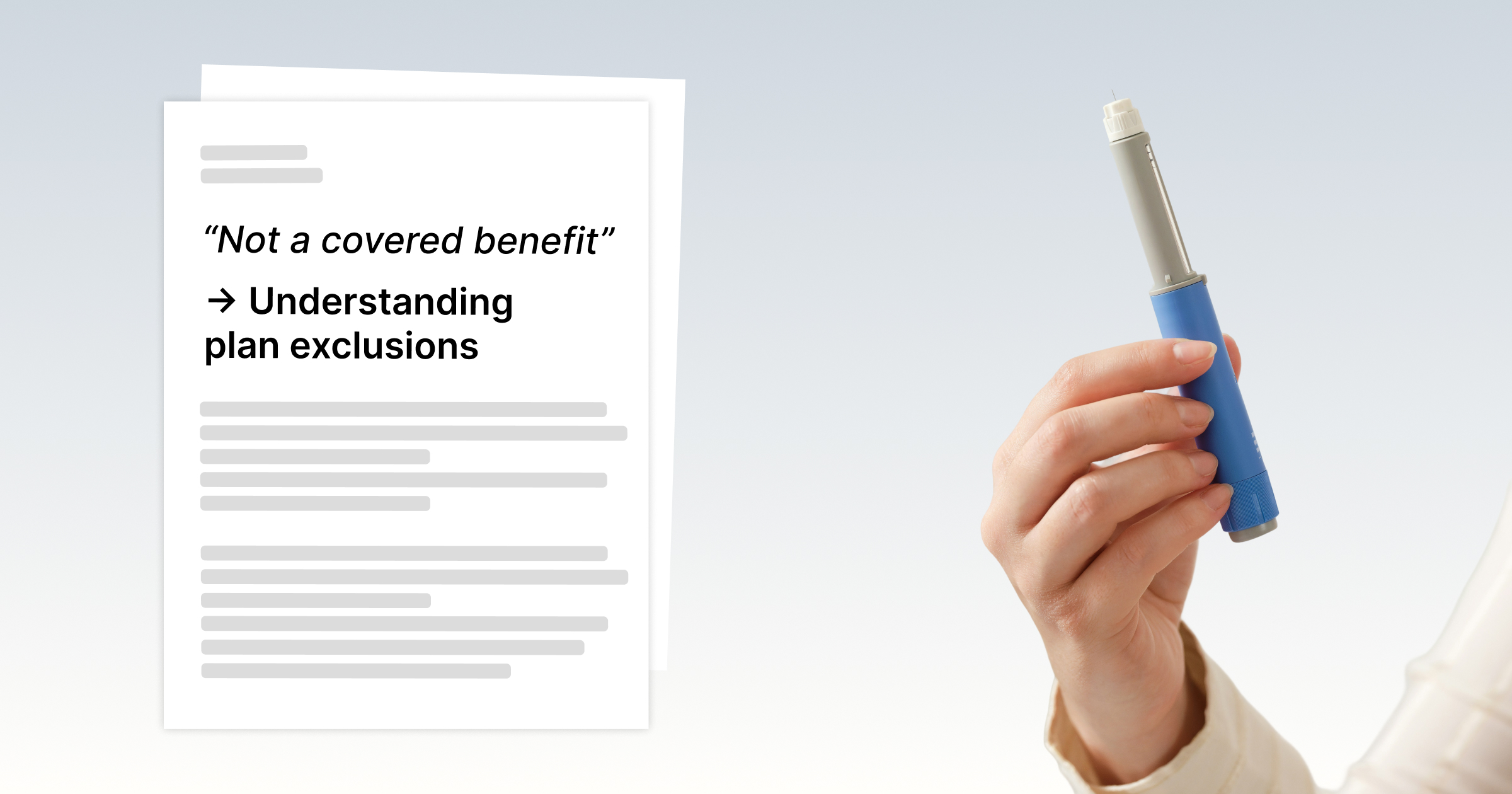Beginner's Guide to Patient Appeals: 10 Essential Rights to Fight Health Insurance Denials

When insurers deny you the care and coverage you deserve, it’s time to stand up, know your rights, and challenge violations head-on. This beginner's guide to patient appeals will cover ten essential patient rights everyone should know.
Imagine this.
You’ve been denied health insurance coverage for a treatment your doctor says you desperately need. That’s the reality more patients are facing as insurers increasingly rely on artificial intelligence and auto-denials, often without proper review. Mistakes are skyrocketing, and insurers aren’t always following the rules.
But here's the silver lining: you have the power to push back.
The Affordable Care Act (ACA) grants patients strong appeal rights that go beyond the protections health providers can request on their behalf.
Beyond well known protections for pre-existing conditions, coverage limits and preventative health services, the ACA also protects Americans from unjust denials. These rights are further supported by similar laws in the Employee Retirement Income Security Act (ERISA), Health and Human Services (HHS) and in all 50 states.
When insurers deny you the care and coverage you deserve, it’s time to know your rights and challenge them head-on. Every Claimable appeal is tailored to do just that, which is why patients using Claimable are successful 85% of the time—1.7 times higher than the industry average.
Not sure what your rights are?
Start Here: 10 Essential Appeal Rights to Fight Health Insurance Denials
1. Right to Multiple Appeals
You are entitled to multiple levels of patient appeals, including internal appeals, independent external reviews, judicial review and regulatory complaints. By contrast, providers are only allowed internal appeals or payment disputes.
The takeaway:
Insurance companies mess up or don't follow the rules—a lot. That's why appeals exist! Think your denial is bogus? File a patient appeal with a supporting statement from your doctor. And if your first attempt doesn't cut it, keep escalating for more chances to win.
Read the fine print:
What appeal options must an insurer provide?
"Each health insurance issuer shall provide an internal claims appeal process and shall comply with the applicable external review process." (ACA, 42 U.S.C. § 300gg-19(a)-(b); ACA, 45 CFR § 147.136)
What types of appeals can request an external review?
You can request an external review after completing all internal appeals if you disagree with your insurer's decisions on issues involving medical judgement, like:
- Medical necessity of care
- Appropriateness of care
- Health care setting
- Level of care
- Effectiveness of a covered benefit
- Experimental and investigational treatments
2. Right to a Qualified (Human) Reviewer
Your appeal must be reviewed by a healthcare professional—not an algorithm—with the right clinical expertise in treating your condition. And no, they're not supposed to be incentivized to deny your claim.
The takeaway:
Always ask for the National Provider Identifier (NPI) to confirm your reviewer’s qualifications. And if there’s evidence the insurer retaliates against fair reviewers or rewards those who deny claims, that could be a powerful argument for your case.
Read the fine print:
Who can review and decide your appeal?
"Such reviewer shall be a person with appropriate expertise who was not involved in the initial determination." (ACA, 42 U.S.C. § 300gg-19(b)(2))
What conflicts of interest must reviewers avoid?
"[T]he plan and issuer must ensure that all claims and appeals are adjudicated in a manner designed to ensure the independence and impartiality of the persons involved in making the decision. Accordingly, decisions regarding hiring, compensation, termination, promotion, or other similar matters with respect to any individual (such as a claims adjudicator or medical expert) must not be made based upon the likelihood that the individual will support the denial of benefits." (ACA, 45 CFR § 147.136 (b) (2) (ii) (D))
3. Right to a Full and Fair Review
Insurance companies must conduct a comprehensive review of all the information submitted with an appeal. This includes giving you the opportunity to present new evidence and ensures your access to your claim file.
The takeaway:
Use this to your advantage! If you've got new evidence that supports you case, use it. And don't forget to ask for your case file—it can contain valuable insights that back your case and you're entitled to see everything they used to make their decision.
Read the fine print:
What types of information must reviewers take into account?
“Provide for a review that takes into account all comments, documents, records, and other information submitted by the claimant relating to the claim, without regard to whether such information was submitted or considered in the initial benefit determination.”
(ERISA, 29 CFR § 2560.503-1(h)(2)(iv); ACA, 42 U.S.C. § 300gg-19(a)(2)(A))
What information must a reviewer share with you?
"[A]llow an enrollee to review their file, to present evidence and testimony as part of the appeals process, and to receive continued coverage pending the outcome of the appeals process." (ACA, 42 U.S.C. § 300gg-19(a)(1)(C))
Learn more: How to Request and Review Your Claim File.
4. Right to Clear and Timely Notification
Insurers must give a written explanation for any denial, with appeal instructions, within these timeframes: 72 hours for urgent needs or formulary exceptions,15 days for prior authorizations, and 30 days for standard reviews.
The takeaway:
Demand your denial notice in writing—it’s your roadmap for fighting back. If they stall, report them to your regulator. The notice, often called a Notice of Adverse Benefit Determination or Explanation of Benefits (EOB), reveals why you were denied and outlines your appeal rights.
Read the fine print:
What must a denial notification include?
"The notification shall be set forth, in a manner calculated to be understood by the claimant—(i) The specific reason or reasons for the adverse determination; (ii) Reference to the specific plan provisions on which the determination is based; (iii) A description of any additional material or information necessary for the claimant to perfect the claim and an explanation of why such material of information is necessary; (iv) A description of the plan's review procedures and the time limits applicable to such procedures..."
(ACA, 42 U.S.C. § 300gg-19(a)(4); 29 C.F.R. § 2560.503-1(g))
Do I need to be able to understand it?
"Provide notice to enrollees, in a culturally and linguistically appropriate manner, of available internal and external appeals processes."
(ACA, 42 U.S.C. § 300gg-19(a)(1)(B))
How long does my insurer have to notify me of my appeal decision?
"Your insurer must notify you in writing and explain why:
Within 72 hours for urgent care cases
Within 15 days if you’re seeking prior authorization for a treatment
Within 30 days for medical services already received"
(healthcare.gov; 29 C.F.R. § 2560.503-1(f)(2))
How long for formulary exception request decisions?
"A health plan must make its determination on a standard exception and notify the enrollee or the enrollee's designee and the prescribing physician (or other prescriber, as appropriate) of its coverage determination no later than 72 hours following receipt of the request." (C) (1) (ii)
45 C.F.R. § 156.122 (c) (1) (ii)
How long do external reviews take?
"Standard external reviews are decided as soon as possible – no later than 45 days after the request was received. Expedited external reviews are decided as soon as possible – no later than 72 hours, or less, depending on the medical urgency of the case, after the request was received."
(29 C.F.R. § 2560.503-1(f)(2))
5. Right to Formulary and Tier Exceptions
You can request and gain access to clinically appropriate medications not otherwise covered by your plan. If approved, the plan must cover the full prescription duration, waive dosing restrictions, or lower costs.
The takeaway:
Is your medication "not covered"? Ask for a formulary exception! It's fast and if they deny it, you can escalate. If the medication is necessary and alternatives won’t work or could harm you, this lets you request full coverage, override limits, or get non-preferred drugs at preferred prices. Tip: doctor's statement is sometimes required.
Read the fine print:
Can I appeal if my medication is 'not covered by the plan'?
"A health plan must have a process for an enrollee, the enrollee's designee, or the enrollee's prescribing physician (or other prescriber) to request a standard review of a decision that a drug is not covered by the plan."
45 C.F.R. § 156.122 (c)
When can I ask for an urgent (24-hour review) of my formulary exception?
"Exigent circumstances exist when an enrollee is suffering from a health condition that may seriously jeopardize the enrollee's life, health, or ability to regain maximum function or when an enrollee is undergoing a current course of treatment using a non-formulary drug."
(45 C.F.R. § 156.122 (c))
How long do granted exceptions last?
"A health plan that grants a standard exception request must provide coverage of the non-formulary drug for the duration of the prescription, including refills... A health plan that grants an exception based on exigent circumstances must provide coverage of the non-formulary drug for the duration of the exigency."
(45 C.F.R. § 156.122 (c))
Can I also request exceptions to formulary tiers?
For Medicare: "A tiering exception should be requested to obtain a non-preferred drug at the lower cost-sharing terms applicable to drugs in a preferred tier."
(CMS, Medicare Exception Policy)
6. Right to Adequate Network
Insurance companies must provide access to a sufficient number of providers within a reasonable distance and time frame, guaranteeing patients timely access to necessary medical care without excessive travel or delays. (NCSL)
The takeaway:
Don’t settle for long waits or drives—your plan must provide timely, nearby care that meets your needs. If the network falls short or if switching providers would cause a risky gap in care, you may qualify for in-network coverage elsewhere.
Read the fine print:
How do I know if my network is adequate?
"Health plans must maintain a network that is sufficient in number and types of providers to ensure that all services are accessible without unreasonable delay." (45 CFR § 156.230)
How does my state decide if my network is adequate?
Find your state's law, here: National Conference of State Legislatures.
7. Right to Safe & Suitable Site of Care
Patients have the right to receive care in a setting that is safe, effective, and appropriate for their medical needs. This includes protection from being forced into unsafe, discriminatory, or inaccessible sites of care.
The takeaway:
Your care, your choice! Plans shouldn’t force you away from your trusted team or push you to facilities with higher costs, longer commutes or unsafe care. Fight to stay with the providers who truly understand your needs—it's worth it.
Read the fine print:
"The patient has the right to receive care in a safe setting."
(ACA, 42 C.F.R. § 482.13(c))
8. Right to Safe Step Therapy
In 38 states, laws protect patients from being forced into potentially harmful or ineffective treatments through ‘fail-first’ step therapy protocols. These protections allow patients to request exceptions to step therapy rules when the patient is stable on their current treatment or the health plan’s preferred drug is unsafe.
The takeaway:
Take control of your treatment! Step therapy protections empower you to request exceptions if a preferred drug isn’t right or if you're stable on your current care. Know your rights—fight back to stay on the care that keeps you healthy.
Read the fine print:
What is an example is a state's step therapy law?
Example state language: "A health insurer shall expeditiously grant a request for a step therapy exception...if a prescribing provider submits necessary justification and supporting clinical documentation supporting the provider’s determination that the required prescription drug is inconsistent with good professional practice..." (California AB-347) (S.652 - Safe Step Act)
What makes a health plan's preferred drug unsafe?
Under most states laws, and a proposed federal law, exceptions must be granted when any of the following apply to a health plan's preferred drug therapy is:
- Contraindicated or likely to cause adverse reactions
- Expected to be ineffective based on the patient’s medical history
- Previously tried and proven ineffective
- Expected to worsen an existing co-morbid condition
- Likely to reduce the patient’s ability to perform daily activities
- A barrier to adhering to the patient’s current therapy or care plan
What restricts forced switching when on stable treatment?
Many states require exceptions for patients who are stable on their current treatment, preventing insurers from enforcing non-medical switching to alternative medications by restricting coverage or raising out-of-pocket costs.
What protects Medicare Advantage members?
As of the 2024 plan year, the Centers for Medicare & Medicaid Services (CMS) prohibits Medicare Advantage plans from enforcing coverage criteria, including step therapy, that is stricter than traditional Medicare. (CMS)
9. Right to Evidence-Based Decisions
Insurers must determine the medical necessity of your treatment based on credible scientific evidence and standards accepted by the medical community. These decisions should never be arbitrary or purely cost-driven.
The takeaway:
If your insurer tries to override your doctor’s orders or ignore accepted standards, push back. Request your Summary Plan Description (SPD) to confirm if they’re following their own rules and challenge any outdated or unsubstantiated policy.
The fine print:
What is the standard for determining which treatments should be covered?
"Base clinical decisions on the strength of scientific evidence and standards of practice, including assessing peer-reviewed medical literature, pharmacoeconomic studies, outcomes research data, and other such information as it determines appropriate." (ACA, 45 CFR § 156.122(a)(3)(iii)(B))
Who decides what care is medically necessary for you?
"A doctor’s attestation that a service is medically necessary is an important consideration. Your doctor or other provider may be asked to provide a “Letter of Medical Necessity” to your health plan as part of a “certification” or “utilization review” process." (NAIC, What is Medical Necessity?)
Where can you find a definition for medical necessity?
"Definitions for medical necessity include a requirement that the treatment is within the accepted standards in the medical community. This is defined in the health plan’s medical policy. A health plan must make its medical policy available to you if it is used to make a decision to deny you coverage." (NAIC, What is Medical Necessity?)
10. Right to Have All Copays Count
Patients are entitled to have all payments—including those made through third party assistance programs—count toward their deductibles and out-of-pocket maximums.
The takeaway:
Although a federal court struck down copay accumulator programs in September 2023 for treatments without generic equivalents, some insurers still try to enforce them, betting that patients won’t know their rights or push back.
The fine print:
What should be excluded from accumulators or maximizers?
From NCSL: “Insurers are now precluded by federal regulation from implementing co-pay accumulators for drugs that lack generic equivalents.” (NCSL; All Copays Count; HIV and Hepatitis Policy Institute et al v. HHS)
You can find specific language about your health insurance appeal rights within the ACA, from HHS and from the Department of Labor (ERISA).
Be the first to know
Get the latest updates on new tools, inspiring patient stories, expert appeal tips, and more—delivered to your inbox.
You're on the list!



